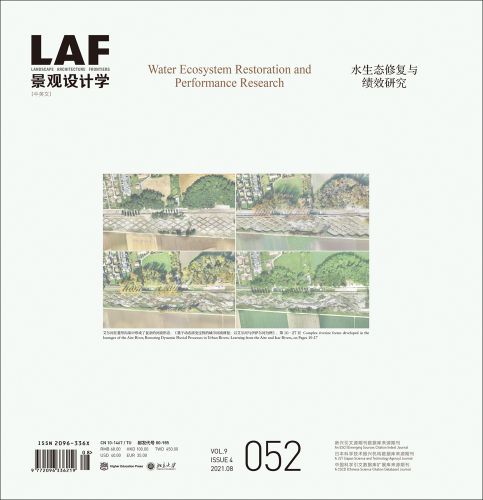
Landscape Architecture Frontiers 052
Water Ecosystem Restoration and Performance Research
- Explores nature-based water ecosystem restoration theories rooted in locality
- Studies the adaptive mechanisms, key design parameters, and ecosystem services of traditional ecological wisdom
- Combines traditional ecological approaches with contemporary water ecosystem restoration technologies, and the methods, practice processes, and optimisation mechanisms of enhanced design
- The research on the analysis, test, and evaluation of water ecosystem restoration performance of nature-based approaches at different scales
As the key to sustaining the health of river basins and improving liveability for a city, a water ecosystem can provide rich services supporting the well-beings of humans. However, traditional techniques of grey engineering have resulted in negative impacts on water ecosystems, directly or indirectly, exacerbating issues such as water shortages, water body pollution, ecological damage, and water culture loss. Scholars attach more and more importance to the research on water ecosystem restoration based on a holistic perspective. Water ecosystem restoration theories have also seen a development from structural studies on rivers, lakes, and wetlands towards holism studies on water ecosystems by exploring related impact factors, restoration processes, scales, mechanisms, and models. In turn, associated restoration practices provide evidence for further theoretical exploration, among which nature-based approaches to water ecosystem restoration has become important measures to respond to the complex challenges of natural–social–economic systems and to enhance the overall water ecosystem services. At present, scholars have worked on extracting restoration modes, patterns, and techniques from traditional ecological wisdom (e.g., traditional agricultural terraces and dike-ponds) for contemporary practices, which have witnessed sound ecological and social performance. However, under pressures of intensified climate change and the increasing need for water resource utilisation, research on the related responses and performance of water ecosystem at different scales remains insufficient. The goals and methods of water ecosystem restoration are often unclear, and long-term monitoring or evaluation of restoration performance is also inadequate.
In this issue, LA Frontiers focuses on:
1) Exploring nature-based water ecosystem restoration theories rooted in locality. 2) Studying the adaptive mechanisms, key design parameters, and ecosystem services of traditional ecological wisdom. 3) Combining traditional ecological approaches with contemporary water ecosystem restoration technologies, and the methods, practice processes, and optimization mechanisms of enhanced design. 4) the research on the analysis, test, and evaluation of water ecosystem restoration performance of nature-based approaches at different scales.
Water ecosystem restoration requires a dynamic and complex nonlinear workflow, which faces many problems and challenges. This issue, by presenting latest research and cutting-edge practice cases worldwide, is expected to introduce nature-based water ecosystem restoration insights and methods which are rooted in locality and can enhance restoration performance, and new measures for performance research and operation test, so as to inspire new research and practice for urban and rural water ecosystem restoration and sustainability.
- Publisher
- ORO Editions
- ISBN
- 9781954081994
- Published
- 23rd Mar 2022
- Binding
- Paperback / softback
- Territory
- World excluding USA, Canada, Australasia & Asia (except Japan; China non-exclusive)
- Size
- 292 mm x 279 mm
- Pages
- 138 Pages
- Illustrations
- 100 color
- Name of series
- Landscape Architecture Frontiers
Distributed by ACC Art Books
Our Catalogues
Please log-in or create an account to see your recent items.